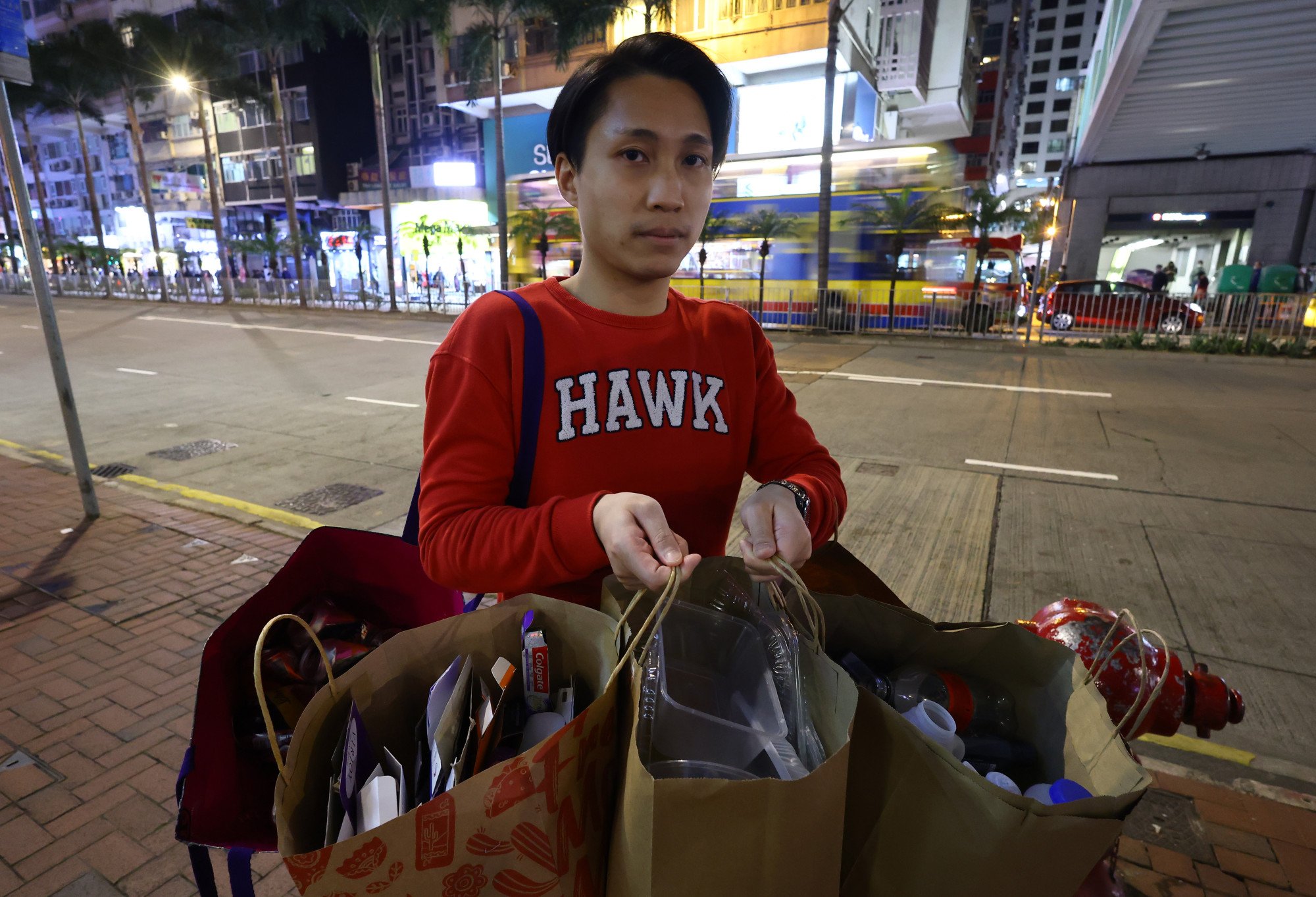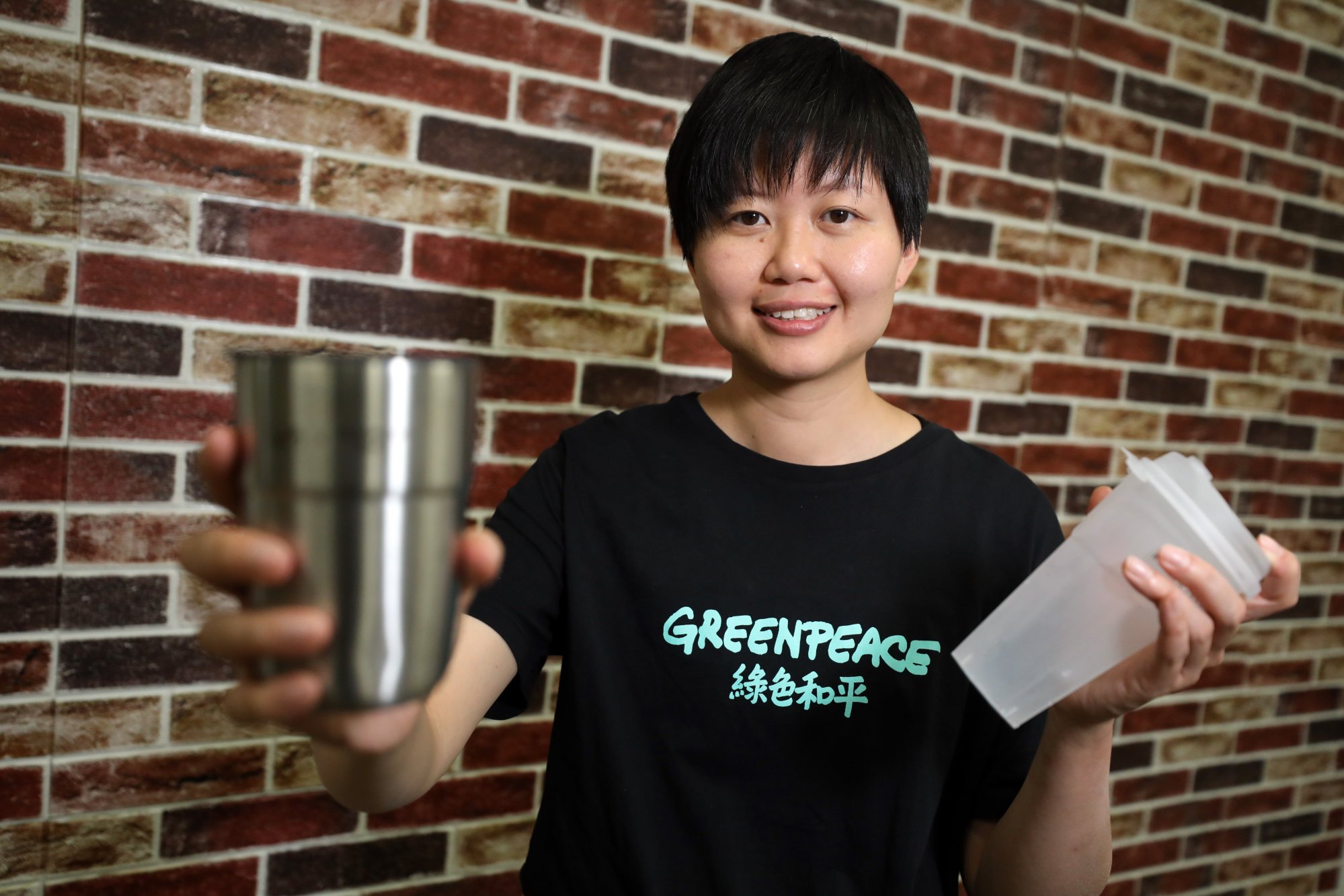Hong Kong will introduce the primary stage within the two-part ban on April 22, which is able to cowl styrofoam merchandise and throwaway utensils resembling cutlery and straws supplied at takeaway spots.
Single-use plastic cups and packing containers may even now not be accessible to patrons eating in.
The launch date for the second part, protecting single-use plastic cups and packing containers for takeaway providers, has but to be introduced.
Environmental authorities earlier mentioned the ban would cowl all containers “wholly or partly fabricated from plastic” and every kind of artificial polymers, from typical plastics to biodegradable ones.
However the coverage is not going to embrace objects that function plastic components or don’t embrace the polymer as a “main structural element”, together with adhesives, inks and binding brokers.

The Environmental Safety Division has arrange a digital platform providing an inventory of inexperienced tableware suppliers and one other protecting objects exempted from the ban.
The Inexperienced Earth mentioned that whereas the ban was exhaustive, it allowed for water-based barrier coatings usually utilized to paper cups, packing containers and bowls.
The substances usually seem as a easy and waxy layer on paper merchandise and shield them from grease and water, in addition to serving to to fill cracks or act as a plaster additive.
The Submit discovered that 22 of the 737 accredited objects on the division’s web site used such coatings.
The Inexperienced Earth’s Chan mentioned the substances may react with warmth to launch microplastics, probably having a poisonous impact on the human physique and contributing to well being issues resembling lung irritation, metabolic issues, in addition to reproductive and developmental issues.
Their presence in merchandise additionally created impurities within the recycling course of and undermined the standard of any ensuing items, he added.
Is Hong Kong prepared for ban on throwaway plastics beginning subsequent month?
Is Hong Kong prepared for ban on throwaway plastics beginning subsequent month?
The Environmental Safety Division instructed the inexperienced group in a reply seen by the Submit that authorities thought-about the coatings to be plastic components, however they might not have an effect on the recycling course of for such containers.
“This may even guarantee there are extra options out there for the business and the general public,” the division wrote.
Leanne Tam Wing-lam, a campaigner with worldwide environmental group Greenpeace, mentioned most of the substitutes may additionally use PFAS as an oilproof lining.
A survey from the organisation in 2016 discovered PFAS, particularly these generally used to supply non-stick surfaces for cookware, have been additionally utilized in clothes, private care merchandise and cosmetics.
Analysis from the Sweden-based Worldwide Pollution Elimination Community final November discovered that multinational meals firms, resembling McDonald’s, KFC, Burger King, Subway and Starbucks, used PFAS-coated wrappings and tableware.
The examine lined 17 international locations and territories, together with the Philippines, Egypt, Mexico and Taiwan.
Seven of the eight samples from Taiwan have been proven to include PFAS, together with a lunchbox pattern discovered to have ranges 57 occasions larger than the really useful European Union customary.

The worldwide community of NGOs additionally described PFAS as “eternally chemical compounds” since they have been extraordinarily persistent within the surroundings, including they may trigger most cancers and infertility, in addition to disrupt an individual’s hormone programs.
Tam at Greenpeace mentioned most throwaway utensils and containers in Hong Kong weren’t examined earlier than they have been offered, that means their security was questionable.
“Many disposable merchandise usually are not as hygienic as they appear,” she mentioned.
5 EU international locations – Germany, the Netherlands, Denmark, Norway and Sweden – plan to introduce a continentwide ban on all PFAS chemical compounds.
Twelve states in america, together with California, Washington and Vermont, have banned the addition of PFAS to meals packaging.
Taiwan led the best way in Asia by regulating 4 varieties of PFAS final August, whereas Japan’s meals security authorities lately proposed a tolerable day by day consumption of 20 nanograms per kilogram of physique weight.
Hong Kong doesn’t presently regulate the usage of PFAS.
Tam additionally mentioned inexperienced tableware suppliers on town authorities’s record weren’t required to declare the presence of PFAS of their merchandise.
80% of Hong Kong eating places not prepared for disposable plastics ban
80% of Hong Kong eating places not prepared for disposable plastics ban
Lawmaker Edward Leung Hei of the Hong Kong Island East geographical constituency mentioned containers with waterproof coatings have been tough to recycle as they have been extra complicated than typical plastics.
“You possibly can neither place them in recycling bins for plastics nor paper,” he mentioned. “Folks will probably be compelled to deal with them like normal waste, rising the quantity of rubbish despatched to landfills.”
Hong Kong has disposed of greater than 200 tonnes of single-use plastic tableware every day for the previous three years.
Simon Wong Equipment-lung, the honorary president of the Institute Of Eating Professionals, mentioned many restaurant homeowners had a tough time distinguishing which merchandise can be allowed beneath the approaching ban.
A verify of the Environmental Safety Division’s record of suppliers discovered almost half nonetheless supplied objects that may be banned after April 22, together with plastic straws and throwaway utensils.
Wong mentioned restaurateurs, particularly small and medium-sized companies, may fall foul of the ban in the event that they relied fully on the provider record and misjudged all of the merchandise on supply as government-approved.
He urged suppliers to make sure the objects they offered to native eating places complied with the brand new coverage.
The Environmental Safety Division mentioned water-based barrier coatings have been “extensively used” and met internationally recognised testing requirements, together with these in mainland China, Europe and Australia.
A spokeswoman mentioned PFAS have been chemically steady, including: “Though some merchandise nonetheless include small quantities of PFAS, the well being dangers to the general public from publicity to such merchandise are very low, and there’s no want to fret about this.”
She added that, for extra readability in regards to the objects registered on the federal government’s platform, authorities would problem a QR code for every accredited product, whereas suppliers would want to print the code on the inexperienced options.